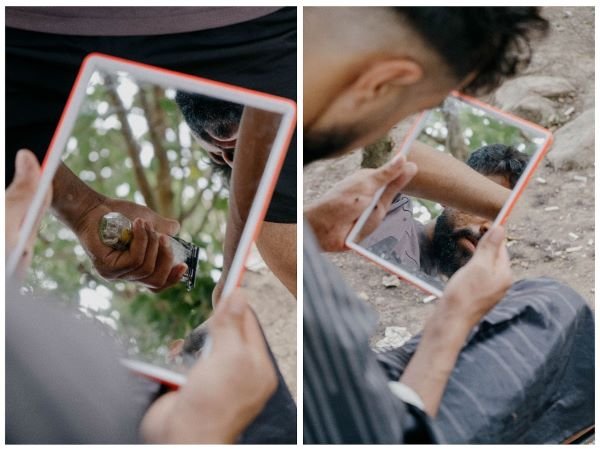“I want to have a better future.” Moments of Connection near the Serbian Border
Tucked away in the back corner of an informal living site in Northern Serbia, a time honored tradition takes place. A small barbershop has been set up under the shade of a tree, complete with a dedicated wooden seat and a small table where electric razors, scissors and small combs are carefully laid out. A group of men sit nearby, sipping sugary tea brought by Collective Aid volunteers and await their turn to be called for the next haircut slot. They joke with one another, often lightly poking fun at each other's new hairstyles or freshly shaped facial hair.
The line for haircuts grows steadily as things quiet down around the rest of the camp. Collective Aid volunteers have finished distributing non food items (NFI) from the van. Today’s distribution includes socks, shirts, bars of soap, wipes and plastic razors, all things that are in great demand for the people living in or passing through the camp. Access to clean drinking water is also almost non-existent, so one volunteer has been helping to fill empty water bottles from our water tank for most of the morning.
Now that essential items have been handed out, people line back up to get their haircut in the corner of the site.
The first in line is Amir, a young man from Syria. Through the noise of the electric shaver, he tells us how he ended up in Northern Serbia. “I fled my home because of violence, because of the war. I want to go to Germany, I want to have a future”.
The next man who sits down in the barbers chair is also Syrian. Salim grew up in Damascus, the Syrian capital. Like many people on the move in the Balkans, Salim fled war in his home country.
“I love Damascus. I love Syria, it’s a beautiful country but the war made it impossible to stay. I was scared everyday. Now I want to live in Germany. I have a friend there, I hope I can stay with him”.
As he inspects his new haircut in a handheld mirror, Salim tells us that he misses his home country. “I love my country, I didn’t want to leave. I had no choice”.
Like so many people that Collective Aid meets on their arduous journeys through the Balkans, Salim left Syria because he felt he had no other choice. The journey that refugees undertake when they are forced to leave their homes can be just as unsafe as the places they are fleeing from. Many endure violence along the way, with beatings and harsh treatment from border police.
As people flee violence and insecurity at home, crossing borders continues to be a difficult and dangerous task. In March of 2016, an agreement between the European Union and Turkey resulted in the hardening of many borders across the Balkans. This left those forced to flee their homes and seek shelter in Europe with few options as their journey’s became stalled at Balkan and EU borders while access to asylum procedures has become ever more limited. This situation has only worsened with the outsourcing of border policing and migration management to the European Union’s external borders and their border force, Frontex. This policy of sealed borders does little to deter people from attempting to reach safety, and often pushes people to use more dangerous or longer routes.
This summer, the number of people attempting to cross through the Northern Serbian border has steadily increased. There has also been an increase in reports about people on the move being “pushed back” while trying to cross the Serbian border. This term refers to the process of illegally forcing people back over a border immediately after they have crossed it, while denying them their legal right to claim asylum or seek protection. Often, these pushbacks involve violence and intimidation carried out by border police.
Collective Aid, as a member of the Border Violence Monitoring Network have extensively documented these illegal and often violent pushbacks, compiling evidence of torture and degrading tactics used by Hungarian border forces and the Serbian police. Volunteers in the field often work with people who carry obvious wounds to the head and body as a consequence of this.
In this environment, where living conditions are poor, access to basic services is limited and violence is common, moments of comfort, a decent haircut, a warm cup of tea, take on new significance.
Words and photos by Advocacy and Communications Officer, Josh Zimber






